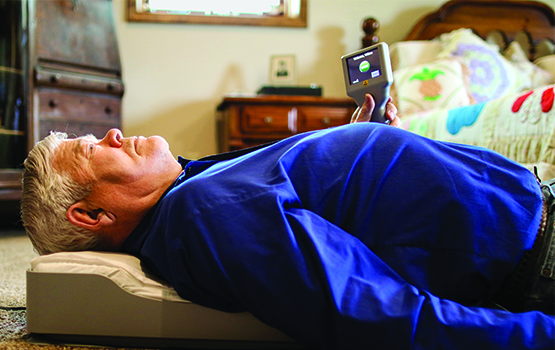For Bill McClellan, the chance to pray inside the Tomb of Jesus in Jerusalem while holding his wife Dee’s hand was the most memorable part of their trip to the Middle East in September 2019. “You’re close to God when you do that,” Bill said.
The McClellan’s trip to Jordan and Israel was just one of many international travel adventures the couple has had in their 54 years together.
Bill was diagnosed with heart failure in 2009 and has since had two heart bypass surgeries. The couple refused to let Bill’s heart failure keep them from seeing the world. Instead, they learned how to manage it while on the road. New medical technology makes it easier.
When the McClelllans headed to the Middle East, they brought along a high-tech traveling companion that could monitor Bill’s heart failure remotely. The device’s official name is CardioMEMS™ HF System. “We call her Elly because it plays elevator music while taking the reading,” Dee laughed.
How CardioMEMS Works
The key piece of the CardioMEMS HF remote monitoring system is a sensor that is slightly larger than a paper clip. The sensor is implanted into the pulmonary artery to track heart pressure readings and fluid retention levels.
Each day, Bill lays on a specially designed pillow that interacts with the sensor and wirelessly sends real-time data to NKCH’s Heart Care Clinic. The team reviews the information on a secure website and contacts Bill if he needs to adjust his medications or schedule a clinic visit.
“CardioMEMS works by measuring the blood pressure in the pulmonary arteries,” explained David Hahn, MD, an interventional cardiologist with Meritas Health Cardiology and the medical director of the Heart Care Clinic.
“When these pressures climb, we know the patient will be in congestive heart failure in about two weeks,” Dr. Hahn added. “With CardioMEMS, we can catch potential problems early, take action to lower those pressures, and help patients with heart failure avoid the emergency room or a hospital stay.”
Peace of Mind
CardioMEMS does much more than reduce hospital readmissions. It also offers people with heart failure peace of mind.
Bill had the CardioMEMS device implanted one month before he and Dee left on their trip to the Middle East, where they would be nearly 6,700 miles from home. What better way to test Ellie’s remote monitoring capabilities?
“We were in Wadi Rum, Jordan, and we went out the desert,” Bill shared. “At the time, I was taking a diuretic in the morning and the afternoon. On one particular day, I knew I wouldn’t be near a restroom, so I didn’t take my afternoon dose.”
That night, Bill and Dee didn’t have access to electricity. That meant no Wi-Fi so Bill couldn’t use his CardioMEMS pillows. “The next night, we were back in a hotel with Wi-Fi so I laid down on Elly and sent my information to the Heart Care Clinic,” Bill said.
The next morning, Dee got a text from the Heart Care Clinic advising Bill how to adjust his medications to stabilize his pressure and fluid retention levels. “That’s how good the CardioMEMS is,” Bill said.
“When you go that far away, you’re taking a risk no matter what you do,” Dee added. “But it felt good to know we had a daily connection to the clinic and that if something didn’t look right, they would check on Bill.”
“CardioMEMS gives me great peace of mind,” Bill said. “I feel like I can do something and not be scared to do it.”
Better Quality of Life
The implant is ideal for people with one or more serious health conditions. “In addition to chronic heart failure, Bill has severe coronary artery disease and has had two bypass surgeries,” said Steven Starr, MD, Bill’s cardiologist with Meritas Health Cardiology. It was Dr. Starr who recommended Bill have the CardioMEMS procedure.
“Bill and Dee wish to remain active and enjoy a good quality of life,” Dr. Starr added. “CardioMEMS gives him a tool to achieve this goal. It allows him to travel and remain out of the hospital because we can manage his chronic heart failure remotely.”
The Heart Care Clinic
Bill sings the praises of NKCH’s Heart Care Clinic. The outpatient clinic, which is part of the hospital’s accredited heart failure program, only treats people with heart failure. The main goal is to help them stay out of the hospital. It is staffed with experts who are certified in and who specialize in treating people with HF.
“The Heart Care Clinic is great because I can come every week if I need to,” Bill said. “This is the only hospital we know of that has something like this. That’s why I brag about this place.”